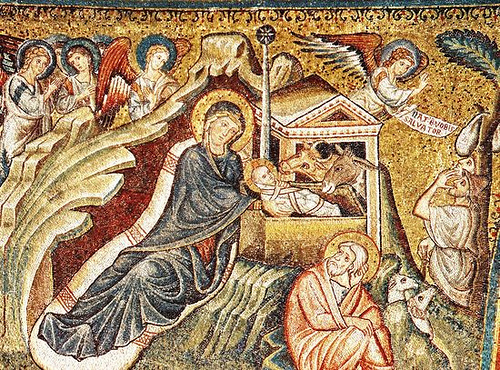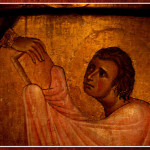We run our website the way we wished the whole internet worked: we provide high quality original content with no ads. We are funded solely by your direct support. Please consider supporting this project.

The Cross in the Manger
There has been a strand within the Western theological tradition—one that is especially prevalent in contemporary American Evangelicalism—that construes the significance of the cross in strictly soteriological terms. The cross is central, in this view, but only in the sense that the reason Jesus came to earth was to pay the price for our sin by dying, thereby allowing God the Father to vent his wrath on him in our place. This myopic focus, combined with this “penal substitutionary” understanding of the atonement, tends to relegate everything else Jesus said and did leading up to his passion to a secondary status. Hence, far from providing the thematic center of Jesus’ identity and mission, this perspective tends to divorce the cross from every other aspect of Jesus’ identity and mission.
The union of God and man in Jesus is “one dynamic event from the incarnation to ascension,” as T. F. Torrance wrote. God did not unite himself to a man and then, as a secondary thing, act. Instead, in Jesus, his personhood, his words and his acts are inseparable.
If this is true, then we can never separate who Jesus is as the God-man from what he did. We can also no more separate Jesus’ atoning work on the cross from the Incarnation and/or any other aspect of his life and ministry. Torrance writes, “we must think of [Christ’s] incarnate life and his redeeming activity as completely interwoven from his conception and birth to his crucifixion and resurrection.” And again, “Incarnation and atonement intrinsically locked into one another constitute the one continuous movement of God’s saving love for the world.”
Moltmann makes a similar point, when he asserts:
The incarnation of the Logos is completed on the cross. Jesus is born to face his passion. His mission is fulfilled once he has been abandoned on the cross. So it is impossible to speak of an incarnation of God without keeping this conclusion in view. There can be no theology of the incarnation which does not become a theology of the cross. As soon as you say “incarnation,” you say “cross.”
We cannot separate his death out from his life. The cross is the quintessential expression of who Jesus was and everything he was about. The indivisible and perfectly integrated wholeness of the one in whom God became human is oriented, from manger to ascension, around the cross. We could say the same thing by claiming that Jesus’ mission centered on sacrificially reconciling humanity to God, or by claiming that Jesus’ mission centered on revealing God’s true, self-sacrificial, loving nature to humanity. The atonement and revelation are two sides of the same coin. God reconciles humanity to himself by revealing his true loving character, and God reveals his true loving character by reconciling humanity to himself. And this revelation-that-is-reconciliation and reconciliation-that-is-revelation takes place in the Word made flesh, understood as “one dynamic event from incarnation to ascension”.
If it is the whole unity of the person and work of Jesus that reveals God to us, then this unity must be centered on the love of God that was supremely revealed on the cross. Hence, while the common, myopic, Evangelical understanding of the cross tends to isolate the cross from other aspects of Jesus’ identity and mission, this view centralizes the cross as the thread that weaves together every aspect of Jesus’ life, from the incarnation first displayed in the manger to his ascension.
Photo Credit: jimforest via Flickr
Category: General
Tags: Christmas, Cross, Incarnation, Jesus, Jürgen Moltmann, T. F. Torrance
Topics: Christology
Related Reading

Parable of the Jerk Loser Son
Birmingham Museum and Art Gallery via Compfight Peter Enns blogged about the parable of the prodigal son, or as he likes to call it, “the parable of the jerk loser son.” It’s actually a reflection about the unbelievable and scandalous love of God. I guarantee it will bless you. From the article: The story isn’t about…

Why Bart Ehrman Doesn’t Have to Ruin Your Christmas (Or Your Faith) Part 6
This is the sixth of several videos Greg put together to refute Bart Ehrman’s claims published in the article What Do We Really Know About Jesus? In this segment, Greg addresses the apparent discrepancies in the genealogies of Luke and Matthew and the implausibility of the idea that they were simply fabricated. We’ve been hearing that people are using…

From Boston, With Love
We posted some of T. C. Moore’s reflections on the Open 2013 conference earlier this week. T. C. lives in Boston and was deeply moved by the violence and terror that came to his city. Now we want to share his most recent blog post Oz and the Cross: Reflections on God’s Love and the…

Forgiving the Unforgivable
Osheta Moore wrote a courageous and challenging post last week entitled Washing the Feet of the Steubenville Rapists. It’s not an easy read, and if you’re vulnerable to triggers in this area, you might want to exercise caution. But Osheta offers a glimpse of redemption in the darkest of places. Can we move towards forgiveness…

Part 3: Disarming Flood’s Inadequate Conception of Biblical Authority
Image by Ex-InTransit via Flickr In this third part of my review of Derek Flood’s Disarming Scripture I will offer a critique of his redefined conception of biblical inspiration and authority. I will begin by having us recall from Part I that Flood holds up “faithful questioning” over “unquestioning obedience” as the kind of faith that Jesus…

The God Who Embraces Our Doubt
Lawrence OP via Compfight Zack Hunt over at The American Jesus posted some of his thoughts on doubt, and it seemed fitting on this week before the Doubt, Faith & the Idol of Certainty conference to share what he had to say. We’re thinking he must have stumbled on Greg’s book or maybe God is…
